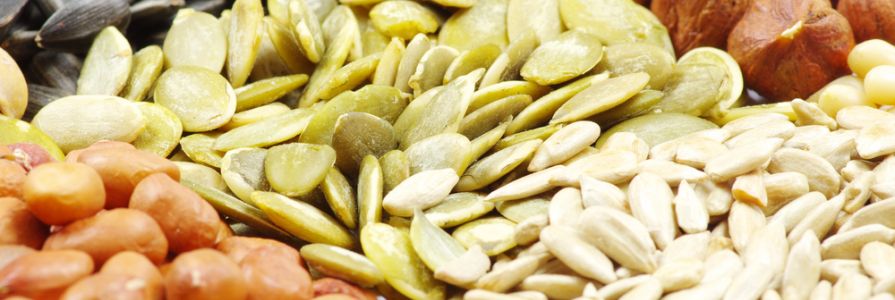Nuts and seeds are healthy snacks, but be sure to moderate portions if you’re watching your weight, since they contain a lot of calories.
Most nuts are rich in healthy monounsaturated fats. Although good for you, these fats are high in calories (almost double the calories per gram as carbs and protein), so you’ll want to carefully watch how many nuts you eat if you’re trying to lose weight.
The good news is that eating the right portion of nuts and seeds (about one handful each day) can help you lose or maintain weight by satiating your appetite. They can also stabilize your blood-sugar levels and improve your cholesterol and triglycerides, which may reduce your risk of type 2 diabetes and heart disease. Additional nutrients in nuts and seeds, such as fiber, magnesium, potassium, and vitamin B6, provide added protection against cardiovascular disease.
Walnuts and ground flaxseeds are especially rich in omega-3 fats, which lower inflammation throughout your body. For this reason, walnuts and flaxseeds are particularly good options for people with arthritis and other inflammatory diseases.
Many nuts and seeds contain magnesium and potassium, which work to prevent osteoporosis. Magnesium also helps protect against type 2 diabetes, and along with manganese and vitamin B6, may improve PMS symptoms.
All nuts and seeds are rich in vitamin E, an antioxidant that helps keep your skin beautiful and may help protect your eyesight. The omega-3 fats, selenium, and zinc in some nuts and seeds offer similar benefits to the skin. Zinc, in particular, helps maintain collagen, which keeps your skin smooth, supple, and firm, and zinc also keeps your nails strong. Along with vitamin B6 and biotin, zinc contributes to healthy hair.
With the aid of nutrients like omega-3 fats, zinc, and niacin (as well as vitamin E), nuts and seeds can help boost eye health, reduce your risk of cataracts and macular degeneration, and slow the progression of vision loss.
While flaxseed, along with some other seeds and nuts that contain omega-3s and magnesium, can help prevent migraines, all nuts and nut butters, as well as pumpkin seeds, sesame seeds, and sunflower seeds, can sometimes trigger migraine headaches in people who are sensitive. Whole nuts and seeds may also trigger IBS symptoms in certain people.






